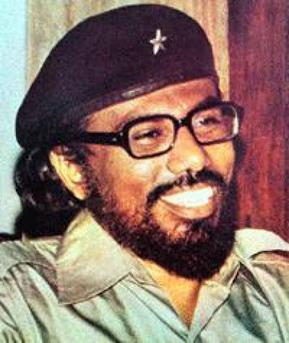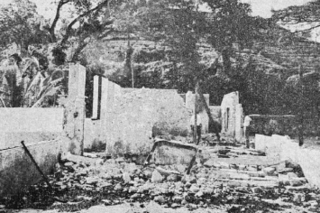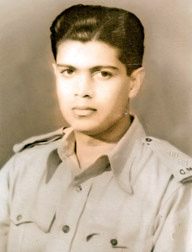
Janatha Vimukthi Peramuna is a Marxist–Leninist communist party in Sri Lanka. The movement was involved in two armed uprisings against the government of Sri Lanka: once in 1971 (SLFP), and another in 1987–89 (UNP). The motive for both uprisings was to establish a socialist state.

Patabendi Don Jinadasa Nandasiri Wijeweera (Sinhala: පටබැඳි දොන් ජිනදාස නන්දසිරි විජෙවීර; 14 July 1943 – 13 November 1989, better known by his nom de guerreRohana Wijeweera, was a Sri Lankan Marxist political activist, revolutionary and the founder of the Janatha Vimukthi Peramuna. Wijeweera led the party in two unsuccessful insurrections in Sri Lanka, in 1971 and 1987 to 1989.

The 1971 Janatha Vimukthi Peramuna (JVP) insurrection was the first of two unsuccessful armed revolts conducted by the communist Janatha Vimukthi Peramuna (JVP) against the socialist United Front Government of Sri Lanka under Prime Minister Sirimavo Bandaranaike. The revolt began on 5 April 1971 and lasted until June of that year. The insurgents held towns and rural areas for several weeks, until the regions were recaptured by the armed forces, following strong support from friendly nations that sent men and material. Although this first attempt to seize power was quickly crushed by force, in 1987 the JVP launched a low-intensity insurgency in the island's southern, central and western regions that lasted several years.

The 1987–1989 JVP insurrection, also known as the 1988–1989 revolt or the JVP troubles, was an armed revolt in Sri Lanka, led by the Marxist–Leninist Janatha Vimukthi Peramuna, against the Government of Sri Lanka. The insurrection, like the previous one in 1971, was unsuccessful. The main phase of the insurrection was a low-intensity conflict that lasted from April 1987 to December 1989. The insurgents led by the JVP resorted to subversion, assassinations, raids, and attacks on military and civilian targets while the Sri Lankan government reacted through counter-insurgency operations to suppress the revolt.
Majuwana Kankanamage Victor Ivan is Sri Lankan journalist. He was a Marxist rebel in his youth and later became the Editor of the controversial Sinhalese newspaper Ravaya. He served as the Editor of the Ravaya for 25 years consecutively since its inception. Victor is an investigative journalist, political critic, a theorist, social activist and also an author of several books.

Sir Oliver Ernest Goonetilleke was a Sri Lankan statesman. Having served as an important figure in the gradual independence of Ceylon from Britain, he became the third Governor-General of Ceylon (1954–1962). He was the first Ceylonese individual to hold the vice-regal post.
The two Romanian People's Tribunals, the Bucharest People's Tribunal and the Northern Transylvania People's Tribunal were set up by the post-World War II government of Romania, overseen by the Allied Control Commission to try suspected war criminals, in line with Article 14 of the Armistice Agreement with Romania which said: "The Romanian Government and High Command undertake to collaborate with the Allied (Soviet) High Command in the apprehension and trial of persons accused of war crimes".

The Criminal Law Act 1967 is an Act of the Parliament of the United Kingdom that made some major changes to English criminal law, as part of wider liberal reforms by the Labour government elected in 1966. Most of it is still in force.
Anthony Christopher Alles or A.C. Alles (1911–2003) was a former Judge of the Supreme Court of Sri Lanka and also a non-fiction (crime) writer.
Felix R. Dias Bandaranaike was a Sri Lankan lawyer and politician, who served as Cabinet Minister of Finance, Parliamentary Secretary for the Prime Minister and Defence and External Affairs (1960–1965) and Cabinet Minister of Justice (1970–77) in the cabinet of Prime Minister Sirima Bandaranaike. He was a very popular person about the anti-corruption campaign and also known as the "virtual leader of the state" during the SLFP governments after the death of Prime minister S.W.R.D. Bandaranaike. He was very active in defeating two major coups against the government, one is 1962 attempted military coup and JVP's 1971 JVP Insurrection.
The 1962 Ceylonese coup d'état attempt was a failed military coup d'état planned in Ceylon. A group of Christian officers in the military and police planned to topple the government of Prime Minister Sirimavo Bandaranaike during the night of 27 January 1962. Organised by Colonel F. C. de Saram, Colonel Maurice De Mel,, Rear Admiral Royce de Mel, C.C. Dissanayake, Sydney de Zoysa and Douglas Liyanage, it was to take place in the night of 27 January 1962, but was called off as the government gained information in the afternoon and initiated arrests of the suspected coup leaders before the coup was carried out.
Sellapperumage Saman Piyasiri Fernando, was the military wing leader of the Janatha Vimukthi Peramuna during the 1987-89 insurrection in Sri Lanka, the JVP's military wing also known as Deshapremi Janatha Viyaparaya (DJV). His position in the JVP as the military commander was organizationally higher than the position of Rohana Wijeweera, the founder of the JVP.
The 1966 alleged Ceylonese coup d'état attempt was an alleged military coup planned in Sri Lanka (Ceylon). The commander of the army and several military personnel were arrested. They were later acquitted of a plot to overthrow the legally elected government.

Lieutenant Colonel Dr. Anthony St. Clare Rex de Costa, MBE, CAVF was a renowned Sri Lankan medical doctor and soldier. He was the commanding officer of the Ruhunu Regiment, a doctor in the Ceylon Defence Force during World War II and a vice president of the World Veterans Federation. He was assassinated by the JVP during the 1971 Insurrection.

Nihal Mahendra Sudrikku Jayawickrama is a Sri Lankan academic. He was the former Permanent Secretary to the Ministry of Justice (1970–1977), Professor of Law at University of Hong Kong (1984–1997), Ariel F Sallows Professor of Human Rights at the University of Saskatchewan, Canada (1992–1993), and Executive Director of Transparency International (1997–2000). He is now an independent legal consultant, and has been the Coordinator of the UN-sponsored Judicial Integrity Group since 2000.
The Bangladesh Collaborators Order, 1972 is a law enacted in 1972 by the Government of Bangladesh to establish a tribunal to prosecute local collaborators who helped or supported the Pakistan Army during the Bangladesh Liberation War and the 1971 Bangladesh genocide. An estimated 11,000 collaborators were arrested. An estimated 2,884 cases were filed at the tribunal until October 1973. Of those accused, 752 received sentencing. Many detainees were released after the 15 August 1975 Bangladeshi coup d'état.
The Judiciary of Sri Lanka are the civil and criminal courts responsible for the administration of justice in Sri Lanka. The Constitution of Sri Lanka defines courts as independent institutions within the traditional framework of checks and balances. They apply Sri Lankan Law which is an amalgam of English common law, Roman-Dutch civil law and Customary Law; and are established under the Judicature Act No 02 of 1978 of the Parliament of Sri Lanka.
Terrorism in Sri Lanka has been a highly destructive phenomenon during the periods of the Sri Lankan Civil War (1983–2009) and the first and second JVP insurrections. A common definition of terrorism is the systematic use or threatened use of violence to intimidate a population or government for political, religious, or ideological goals. Sri Lanka is a country that has experienced some of the worst known acts of modern terrorism, such as suicide bombings, massacres of civilians and assassination of political and social leaders, that posed a significant threat to the society, economy and development of the country. The Prevention of Terrorism Act of 1978 is the legislation, that provides the powers to law enforcement officers to deal with issues related to terrorism in Sri Lanka. It was first enacted as a temporary law in 1979 under the presidency of J. R. Jayewardene, and later made permanent in 1982.

S. W. R. D. Bandaranaike, the fourth Prime Minister of Ceylon, was assassinated by the Buddhist priest Talduwe Somarama Thero on September 25, 1959, while meeting the public at his private residence, Tintagel, at Rosmead Place in Colombo. Shot in the chest, abdomen and hand, Bandaranaike died the following day at Merchant's Ward of the Colombo General Hospital. He was the first Sri Lankan national leader to be assassinated, which led to his widow Sirimavo Bandaranaike becoming the world's first female prime minister.
Wijayamuni Devage Athula Nimalasiri Jayasinghe was a Sri Lankan revolutionary and politician. A JVP leader of the 1971 JVP insurrection, Jayasinghe was later elected to the Sri Lankan Parliament and served as a Deputy Minister of Power and Energy.








